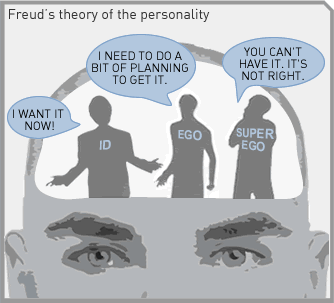
With booming, whooshing sounds and blue-green lights creating an effect of light reflecting off of water, one is forced to conclude that reality is not all there anymore. Lynch makes the implausibility of this scene all the more apparent by using lights and sound to present the supernatural event. In another instance, perhaps the most distinct surreal moment in the movie, he is somehow replaced in his jail cell by Pete. In "Lost Highway," the viewer sees similar examples of unreality, as in the way Fred disappears into a shadow in his bedroom and his wife cannot find him. The id, ego, and super-ego are all working simultaneously to create an experience which might feel like reality, but is completely unreal in certain, distinct ways.

This gives a strong indication that the dream-work is, essentially, a dynamic between the pleasure principle and the reality principle. When rationality can offer no next step, irrationality (magic, surrealism) takes over and does the rest. In dreams the mind has a tendency to fill in holes when necessary to keep the story moving. How did he get there? No explanation is given for his seemingly sudden ability to command the horses and get to where he needs to be, in the middle of a blizzard, no less. Then, magically, he appears at the patient's house. The last image the reader has before he takes off is the complete lack of control he has with the horses. One example involves the trip the doctor makes from his residence to that of his patient. How does the reader know that this story is a dream, when in fact it seems likely that much of it could actually have happened? 'Time' provides the clearest indications for the reader. In the realm of works which blur the line between reality and fantasy, The Country Doctor is an exemplary text to examine. How do we know it is a dream and not merely poor story-telling? How do we know what is real and what only exists in the mind? And since the nature of this dream seems very Freudian, what does each character represent, and how does that character contribute to the purpose of the dream? These are all questions that should and will be addressed to effectively understand "Lost Highway." Hidden within it is the latent content which will give the viewer an understanding of what is happening in the mind of this man. Consequently, what happens is not merely manifest content to be brushed aside. However, the plot is also the most important aspect of the film, because, ultimately, almost everything each character does seems to be part of a dream in the mind of the central character, Fred Madison.
#ID EGO SUPEREGO EXAMPLES IN MOVIES MOVIE#
The very nature of plot demands a sense of linearity, and this movie lacks such a characteristic.

The viewer will watch what is happening, trying to get a sense of the plot, but the plot, really, is unimportant. Hitchcock's "MacGuffin" - the term he coined to refer to the apparent plot of a story, which is merely a cover for the underlying, more important thread - is both irrelevant and vital in this film. Such is the dilemma with "Lost Highway," a movie seemingly bent on walking its viewers down one path, and then, when they begin to understand the nature of it all, to abruptly change course and begin anew. But often the fragmented oddness of such a vision damages its credibility, and one is left wondering how something so disjointed could contain insight of any value. According to Freud, if we take its contents seriously, it has the potential to reveal things about ourselves that we scarcely believe could be true. Not necessarily the way they happened.Ī dream can mean everything, or it can mean nothing. Dream Interpretation of the Film "Lost Highway" Dream Interpretation of the Film "Lost Highway"įred: I like to remember things my own way.įred: How I remembered them.


 0 kommentar(er)
0 kommentar(er)
